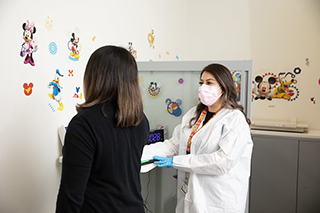
Diet may play a role in the development of dangerous high blood pressure disorders in late pregnancy among Hispanic women, according to research at the Maternal and Developmental Risks from Environmental and Social Stressors (MADRES) Center for Environmental Health Disparities.
The researchers followed 464 pregnant women living in Los Angeles during the last three months of pregnancy to explore possible links between women’s diets and the diagnosis of high blood pressure. High blood pressure during pregnancy increases the risk of developing disorders such as preeclampsia, a late-pregnancy condition that can lead to serious complications for both mother and baby.
“Our findings suggests that a diet high in non-starchy vegetables, oils, and fruit may lower the likelihood of developing a high blood pressure disorder during pregnancy,” said Luis Maldonado, Ph.D., a postdoctoral researcher at the Center, who led the study. “Conversely a diet with relatively higher intakes of solid fat, refined grains, and cheese may increase the likelihood of preeclampsia diagnosis.”
Maldonado presented this research at the American Heart Association’s Epidemiology, Prevention, Lifestyle & Cardiometabolic Health Conference held March 1-4 in Chicago.


